Alberta Content
1. Although I awoke in a bad mood this morning after my crushing lottery defeat last night, I got a big kick out of this, in my morning Herald:
Robert Remington
Calgary Herald
Thursday, October 27, 2005
Twenty-five years after the National Energy Program brought Calgary to its knees, Liberal revisionists are urging Albertans to "get over it" and claiming that the stories of lost houses and failed businesses are overblown.
Here's what one Internet blogger, CalgaryGrit, had to say about it in a posting on Aug. 5:
"I have been door knocking and had people who were in pre-school when the NEP was brought in tell me that it's the reason they won't vote Liberal. Over time it has grown to mythic standard even though no one in Alberta really knows what it was or what it did," says CalgaryGrit.
"The bottom line is the NEP was a legitimate policy that fell victim to poor timing. It's been an easy scapegoat all these years, even though no one understands its intent or consequences. There are a lot of good reasons for Albertans to be p---ed off with Ottawa and the Liberal Party -- I just wish they'd focus on some of them instead of living in the past and an ill-fated, good-intentioned policy."
I'm actually more surprised that the Herald bleeped out "pissed" than I am that they quoted me as a "Liberal revisionist". Regardless, the article follows with quotes from several very smart people and Rod Love, explaining how terrible things got in Alberta in the 80s. For the record, I don't disagree with that at all. I just think that the collapse of the world price of oil had more to do with the bust than the NEP. Especially when the federal government re-negotiated the deal multiple times as the price of oil fell. The oil economy tanked everywhere around the world, not just Alberta.
2. For those who say that transfer payments never come to Alberta, take a look at this.
3. I saw this on Daveberta yesterday and it made the Globe this morning. Trust me, if my cheque looked like that, I'd gladly flip-flop in support of the rebate idea.
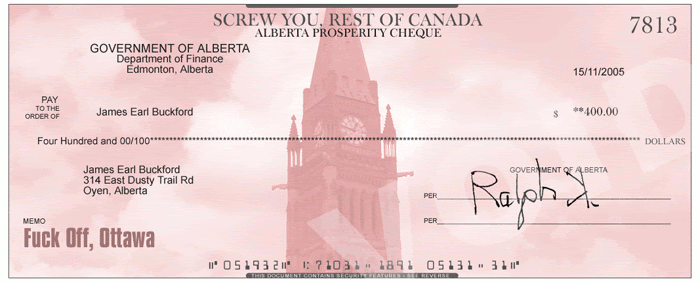
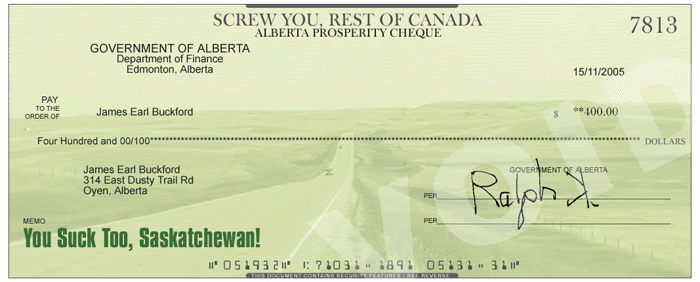
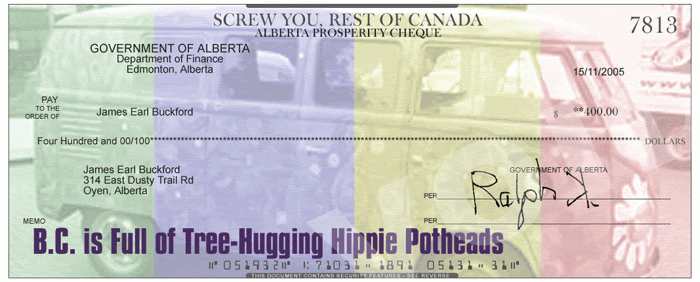
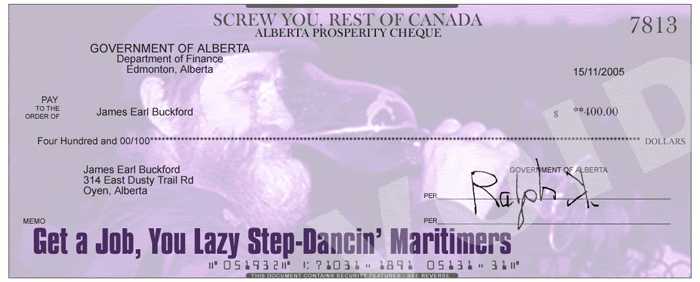
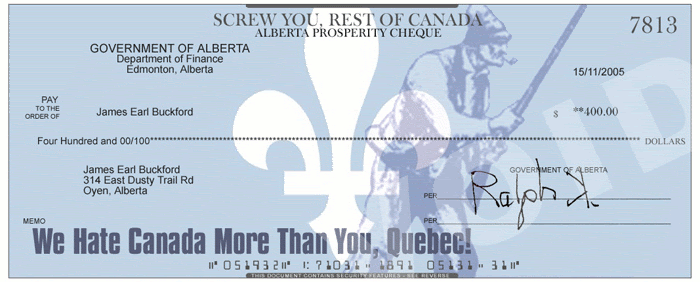
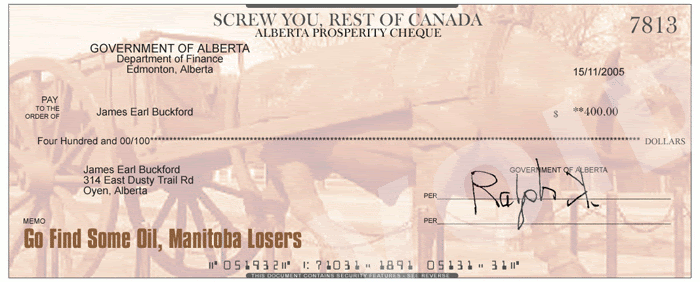






13 Comments:
I think that people forget that the 8os were hard on Alberta through tow governments.
Those of us old enough to remember recall that the Tories maintained the most hated elements of the NEP, the Petroleum Gas Revenue Tax (PGRT) through many of the most difficult years after promising to scrap it in 1984.
And, perhaps more importantly, it was the Tories who moved to world pricing for Alberta's oil, before the price dropped under $10/bbl. 1987 wasn't a very happy summer in Calgary.
The floor price for domesticly consumed oil, included in the NEP, would have sheltered Albertans from the full impact of the world oil price decline--in exactly the same way that the dual price for oil sheltered consumers as the price went up.
In essence, it reflected sharing the risk of volitile commodity prices.
Of course, no one in Alberta talks about that anymore.
By Anonymous, at 3:15 p.m.
Anonymous, at 3:15 p.m.
It is the nature of the beast that it is not taught in Alberta public schools that the collapse of *world* oil prices, not just the NEP, as if it were some single handed goliath that spread disaster in Alberta. CalgaryGrit's post on this was spot on. Nice work on making it into the Herald!
By Keegan, at 3:48 p.m.
Keegan, at 3:48 p.m.
woo hoo!~ we beat the Globe!
Mwahaha. Take that Toronto! :-P
By daveberta, at 4:02 p.m.
daveberta, at 4:02 p.m.
Those cheques are quite amusing!
By John Murney , at 3:01 a.m.
John Murney , at 3:01 a.m.
The oil economy tanked everywhere around the world, not just Alberta.
Funny how it tanked in Alberta right after the NEP was brought in, and didn't tank in the rest of the world until a couple years later.
By Anonymous, at 6:52 a.m.
Anonymous, at 6:52 a.m.
Ya, no one in Florida ever complains about hurricanes. Instead of talking about the NEP, lets talk about how Albertans never do anything for Canada.
By Anonymous, at 11:27 a.m.
Anonymous, at 11:27 a.m.
Maybe its because any suggestions from Albertans (or anybody who is not from Ont-Que or a senior member of the Liberal Party) is ridiculed as scary, too american, uncanadian, take your pick. So after awhile you just say screw it we'll just pay our taxes and do things for us as we see fit.
By Anonymous, at 11:33 a.m.
Anonymous, at 11:33 a.m.
Ya Dusty, but Albertans don't actually work for their money. They just scoop it out the ground. Its just geography.
By Anonymous, at 1:01 p.m.
Anonymous, at 1:01 p.m.
I don't really have much to contribute to the debate going on here, I just wanted to note my experiences growing up in Fort McMurray during the '80s. If any place was hard hit by the low energy prices it was Fort Mac, I remember the majority of my friends had parents who had either lost their jobs or were laid off due to cut backs. Indeed, during that period many of the people I knew were forced to move out of the city to find work. Yet, one thing that I never noticed was people complaining about the NEP. At the time, people blamed global energy prices. That was something I remember clearly, but I don't remember a single incident back then where people blamed Ottawa for their misgivings. Indeed, I didn't hear complaints about the NEP until far more recently and still then it generally was here in Calgary that I heard them, then anywhere else in the province.
-Socialist Swine
By Unknown, at 8:33 p.m.
Unknown, at 8:33 p.m.
Actually, the NEP was roughly as much to blame for Alberta's woes as most Albertans tend to think. The general view is about par with reality.
I spent several years in investment banking, doing mergers and acquisitions in oil and gas. What the NEP effectively did was to leech capital out of the Canadian oil and gas concerns at a time when oil prices were healthy, leaving them bereft of security when the low prices came.
Some have argued here that it was low oil prices that were to blame. Well, no, they weren't the entire problem. In point of fact, Alberta would have been able to endure the period of lows much better if it had been allowed to keep the money that came in from the higher periods during the NEP. Houston, though on slightly tougher times during the oil lows, did not experience the same bankruptcy rates as did Alberta.
This is why Alberta is perfectly justified in telling Ottawa "hands-off" on oil money because, let's face it, oil is a rather volatile commodity, and when the lion's share of provincial incomes is derived from a singular and volatile industry, one must save during the periods of high cashflow to compensate for the days of low cashflow that will inevitably return.
In any case, the NEP pulled the cashflow out of Canadian companies leaving them sitting ducks to acquisitions by their better capitalised American competitors. So, if you are one who complains about the number of American companies who are operating in the Canadian oil patch - thank the NEP. The round of takeovers by American firms during this period was, well, statistically staggering.
Enter problem two - this missing cashflow from Canadian oil companies (the main economic driver in the province) also caused an absence of cashflow in the smaller industries. A company with minimal cashflow is going to focus on survival economics. Little exploration, little research and development, no special projects, etc. So things dry up. Suddenly your Alberta law firm which has focused on the industry has no client willing to pry their wallet open since there's no new work. Your petroleum service company can't get a project. Research and development gets cut off completely. Being a Geologist becomes the worst thing to be in the economic scheme, and one must hope that McDonald's doesn't reject them because they are overqualified.
In any case, no need to hammer the point home - just that one should consider other areas of the world who went through the same oil lows without the failure rates of NEP/PostNEP Alberta. Though perhaps not comfortably, other oil economies did weather the storm, and did survive without the same inordinately high level of bankruptcies, etc. Inescapable conclusion based on the evidence: the policy was the problem. The data supports it.
Oh, and to the gentleman who thinks that oil can be cheaply scooped out of the ground with a bucket, might I extend the invitation to pay a visit to an actual oil rig, or oilsands development? I don't think anyone in Canada does harder work than those poor bastards on the oil rigs.
In addition, Canadian oil is not so easily extracted as our Saudi counterparts. Saudi Arabian oil is mostly in what is referred to as a "salt dome formation". You still have to drill down to poke a hole in it, but once acheived, the well produces fairly well under its own pressure. Result? Cost of producing the oil is about $2-3/bbl. Canadian oil is not so lucky. Even most conventional oil has to be pumped. Cost $5-9/bbl. Don't forget that companies have to pay to transport their oil on pipelines or tankers before it can be refined.
Modern day Alberta is even more difficult. Oilsands require either mining or various "in-situ" processes, most of which require lots of steam, and then have to be upgraded from raw bitumen to a synthetic substance roughly resembling crude oil. Result? Present cost per barrel for synthetic crude from the oilsands is going to be anywhere from $11-20+/bbl depending on natural gas prices, etc. So Alberta should be cautious with their money. If oil dropped down to $20, it would hardly be economically viable for oilsands production. Don't forget that these are the costs of production only. Not the costs of running a company. Nor the cost of paying your employees.
Perhaps Ottawa should implement the NCP - national car program. We'll force southern Ontario car manufacturers (for the good of the country and economy in general, mind you) to sell their cars at only 65% of the price other countries are paying.... or do you think that would lead to an outcry?
By Anonymous, at 10:51 p.m.
Anonymous, at 10:51 p.m.
After all, Alberta's oil industry is no more of a geographic fluke than Ontario's auto industry.
By Anonymous, at 3:36 a.m.
Anonymous, at 3:36 a.m.
Yeah, I know. That whole "Ontario being next to the St. Lawrence" means that's where so many people came into Canada way back when, creating today's present population densities - ergo manufacturing labor. Plus the St. Lawrence allows shipping of heavy materials back and forth (cars, iron, whatever).
Talk about a geographic fluke working in Ontario's favor. Those lucky bastards in Windsor, Toronto, and the like. Try shipping stuff across the prairies! Little dry for your boat. Too bad train shipping is so much more expensive per kilo vs. ship that it makes an auto industry "not economically viable" out west.
I guess if the St. Lawrence had ended in Alberta, they just might have enough population and means to have an auto industry...
Oh well, I guess geography will have to continue to play its role in determining where economically viable manufacturing centres can form - places close to water... England, Japan, Korea, South Asia.
Hell, do you think I'll find any investors if I want to try a heavy manufacturing project in the Gobi or the Sahara? All you need is determination and good character, right? Hello?
By Anonymous, at 4:13 a.m.
Anonymous, at 4:13 a.m.
2015-12-22keyun
uggs boots for women
adidas originals store
michael kors outlet clearance
north face jackets
ugg boots
jordan shoes
ray-ban sunglasses
nike air max uk
michael kors outlet
louis vuitton outlet stores
marc jacobs outlet
ugg boots
michael kors outlet
cheap ugg boots
prada handbags
canada goose jackets
ugg boots on sale
louis vuitton purses
ugg australia
gucci handbags
kids lebron shoes
michael kors outlet online
timberlands
adidas superstar shoes
uggs outlet
louis vuitton purses
beats by dre
michael kors outlet
canada goose
ray bans
nike running shoes for men
canada goose sale
cheap rolex watches
ugg outlet
michael kors outlet sale
discount jordans
oakley store
hollister
uggs sale
jordan 11 concord
By 柯云, at 8:13 p.m.
柯云, at 8:13 p.m.
Post a Comment
<< Home